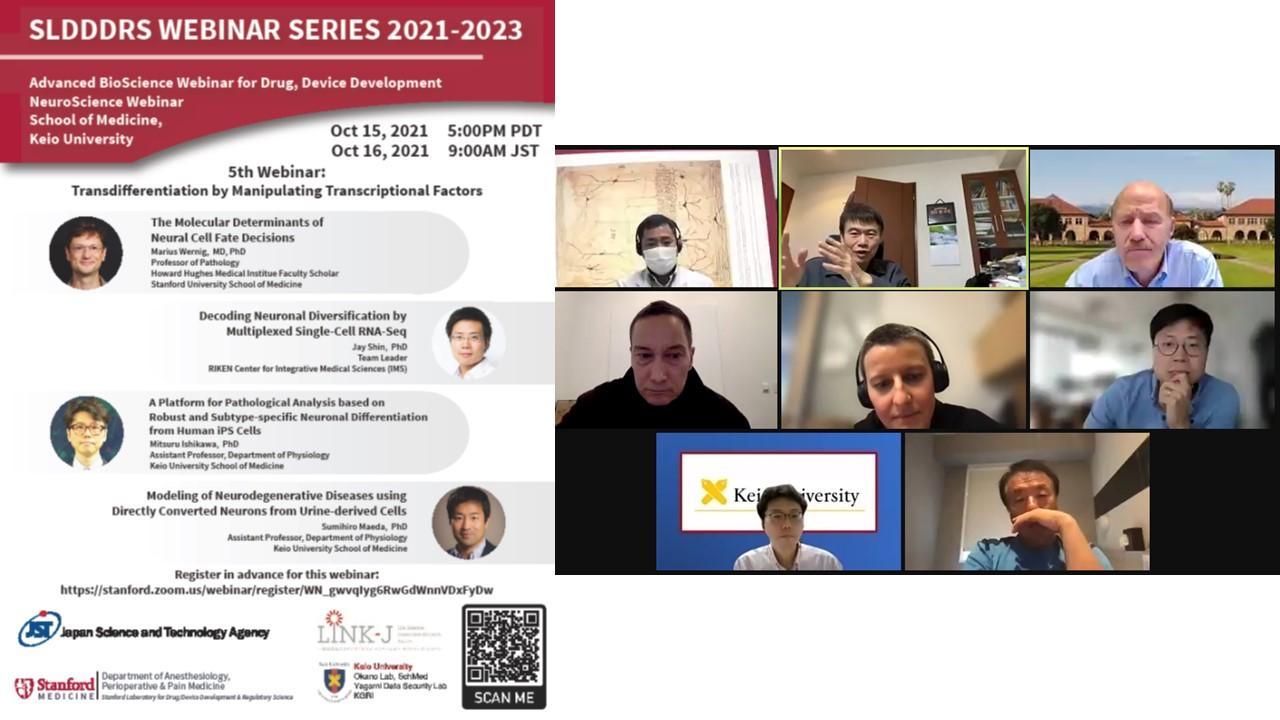[Event report] 5th Keio-Stanford Webinar (held on October 16, 2021)
2021.10.22The 5th Keio-Stanford Webinar was held on Saturday, October 16, 2021. The theme of the event was "Transdifferentiation by Manipulating Transcriptional Factors," with the Department of Anesthesiology, Perioperative and Pain Medicine (SLDDDRS) at Stanford School of Medicine; and the Department of Physiology at the School of Medicine and Yagami Data Security Lab at Keio University, acting as hosts, while KGRI; the Life Science Innovation Network Japan (LINK-J); and the Japan Science and Technology Agency (JST) served as co-hosts. Approximately 100 people participated in the session, which took the form of an online seminar.
To begin, Professor Toshihiko Nishimura (SLDDDRS, Stanford University School of Medicine) and Professor Hideyuki Okano (Keio University School of Medicine; Head of International Advisory Board of SLDDDRS) delivered the opening remarks, explaining the significance of the Keio-Stanford Webinar and giving an overview of transdifferentiation from somatic cells, the theme of the event.
The event then continued with lectures from four speakers.
- For Keynote Speech 1, Dr. Justin Jana delivered a lecture in place of Professor Marius Wernig of the Departments of Pathology and Chemical and Systems Biology at Stanford University School of Medicine, who had been scheduled to lecture but cancelled due to an emergency. Dr. Jana's lecture primarily dealt with the types of transcription factors working in unison as well as the factors targeted when transdifferentiating mouse fibroblasts into neurons. Dr. Jana introduced that during the transdifferentiation to neurons from fibroblasts, a gene known as Ascl1 targets the histone variant H2A.z to induce chromatin remodeling. This lecture clarified the key molecules for improving transdifferentiation and widened its future applications.
- For Keynote Speech 2, Dr. Jay Shin, a team leader at the RIKEN Center for Integrative Medical Sciences, delivered a lecture on systems to elucidate the types of genes effective in the reprogramming of fibroblasts into neurons. Dr. Shin talked about a screening method to identify genes effective in transdifferentiation of fibroblasts to neurons. He introduced pooled gene sets to fibroblasts, identified only converted cells and distinguished which genes have been introduced to these cells using a single-cell analysis method. This lecture was persuasive testament that single-cell analysis will continue to support various breakthroughs.
- For Short Talk 1, Mitsuru Ishikawa, an assistant professor at Keio University School of Medicine's Department of Physiology, presented on a system to directly induce neurons without the mediation of neural stem cells from iPS cells. Using the system, he could rapidly induce matured neurons that had electrical activity. He also introduced a method to induce both excitatory and inhibitory neurons individually. During the lecture, he introduced a case study of application of this technology to bipolar disorder, whetting appetites for future developments.
- For Short Talk 2, Sumihiro Maeda, another assistant professor at Keio University School of Medicine's Department of Physiology presented on the capability of direct induction of neurons from human urine-derived cells; the reflection of donor ages in these cells; and applications of this method to age-dependent neurodegenerative diseases. The potential applications to various neurodegenerative diseases introduced during the lecture mean we can relish the prospect of a follow-up report.
A question and answer session in a panel discussion format took place after all presentations finished, occasioning lively exchanges between audience members and responding panelists.
Professor Hideyuki Okano and Professor Peter Kao (Stanford University School of Medicine, SLDDDRS) delivered the closing remarks and summarized the webinar. In addition, it was announced that the next Keio-Stanford Webinar will be held on the morning of Saturday, November 6, Japan time (the evening of November 5, US) with the theme of Functional Genomics. Professor Howard Chang, renowned for developing ATAC-seq, will also be appearing. Overviews of the latest research findings, and lively discussions involving early career and seasoned participants, ensured that this proved to be a webinar of notable research and educational value.

[Event information]
5th Keio-Stanford Webinar (October 16, 2021)
[Event report]
1st Keio-Stanford Webinar "Neurodegenerative diseases" (held on January 30, 2021)
2nd Keio-Stanford Webinar "Organoids" (held on March 20, 2021)
3rd Keio-Stanford Webinar "Regenerative medicine" (held on May 29, 2021)
4th Keio-Stanford Webinar "Sleep" (held on July 17, 2021)





